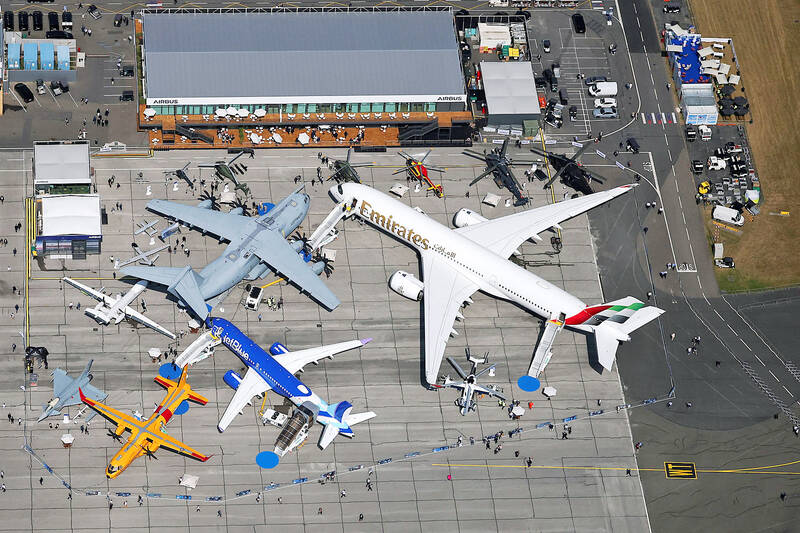Airbus SE maintained its momentum on the second day of the Paris Air Show, locking in an order from Vietjet for 100 A321 narrowbody jets.
The low-cost Vietnamese airline has an option to buy 50 additional units of the highest-capacity single-aisle jet that Airbus makes, the companies said at a briefing at the Paris Air Show yesterday. Bloomberg News previously reported that VietJet was in talks for as many as 100 A321neos.
Based on Ishka estimates, the Vietjet memorandum of understanding is worth at least US$6.6 billion and as much as US$9.9 billion after customary industry discounts.

Photo: Reuters
VietJet has become a prolific buyer of Airbus jets, including a recent commitment to double its fleet of A330neo widebody planes to 40 units for long-haul expansion.
With yesterday’s announcement, the budget carrier’s order backlog stretches to almost 500 planes. However, the deal comes amid a UK legal tussle with an aircraft lessor as VietJet refuses to pay US$180 million in line with a court order, claiming it’s in financial difficulties.
On Monday, Airbus kicked off the Paris Air Show with orders from two Saudi Arabian customers valued at as much as US$17 billion. The planemaker also landed a major purchase from Poland’s LOT Polish Airlines.
In contrast to Airbus’s commercial activity at the show, Boeing Co has scaled back its presence at the event following a crash involving one of its jets in India last week. Boeing chief executive officer Kelly Ortberg called off his attendance, and the US company hasn’t disclosed any new orders at the expo.

JITTERS: Nexperia has a 20 percent market share for chips powering simpler features such as window controls, and changing supply chains could take years European carmakers are looking into ways to scratch components made with parts from China, spooked by deepening geopolitical spats playing out through chipmaker Nexperia BV and Beijing’s export controls on rare earths. To protect operations from trade ructions, several automakers are pushing major suppliers to find permanent alternatives to Chinese semiconductors, people familiar with the matter said. The industry is considering broader changes to its supply chain to adapt to shifting geopolitics, Europe’s main suppliers lobby CLEPA head Matthias Zink said. “We had some indications already — questions like: ‘How can you supply me without this dependency on China?’” Zink, who also

The number of Taiwanese working in the US rose to a record high of 137,000 last year, driven largely by Taiwan Semiconductor Manufacturing Co’s (TSMC, 台積電) rapid overseas expansion, according to government data released yesterday. A total of 666,000 Taiwanese nationals were employed abroad last year, an increase of 45,000 from 2023 and the highest level since the COVID-19 pandemic, data from the Directorate-General of Budget, Accounting and Statistics (DGBAS) showed. Overseas employment had steadily increased between 2009 and 2019, peaking at 739,000, before plunging to 319,000 in 2021 amid US-China trade tensions, global supply chain shifts, reshoring by Taiwanese companies and

Taiwan Semiconductor Manufacturing Co (TSMC, 台積電) received about NT$147 billion (US$4.71 billion) in subsidies from the US, Japanese, German and Chinese governments over the past two years for its global expansion. Financial data compiled by the world’s largest contract chipmaker showed the company secured NT$4.77 billion in subsidies from the governments in the third quarter, bringing the total for the first three quarters of the year to about NT$71.9 billion. Along with the NT$75.16 billion in financial aid TSMC received last year, the chipmaker obtained NT$147 billion in subsidies in almost two years, the data showed. The subsidies received by its subsidiaries —

At least US$50 million for the freedom of an Emirati sheikh: That is the king’s ransom paid two weeks ago to militants linked to al-Qaeda who are pushing to topple the Malian government and impose Islamic law. Alongside a crippling fuel blockade, the Group for the Support of Islam and Muslims (JNIM) has made kidnapping wealthy foreigners for a ransom a pillar of its strategy of “economic jihad.” Its goal: Oust the junta, which has struggled to contain Mali’s decade-long insurgency since taking power following back-to-back coups in 2020 and 2021, by scaring away investors and paralyzing the west African country’s economy.